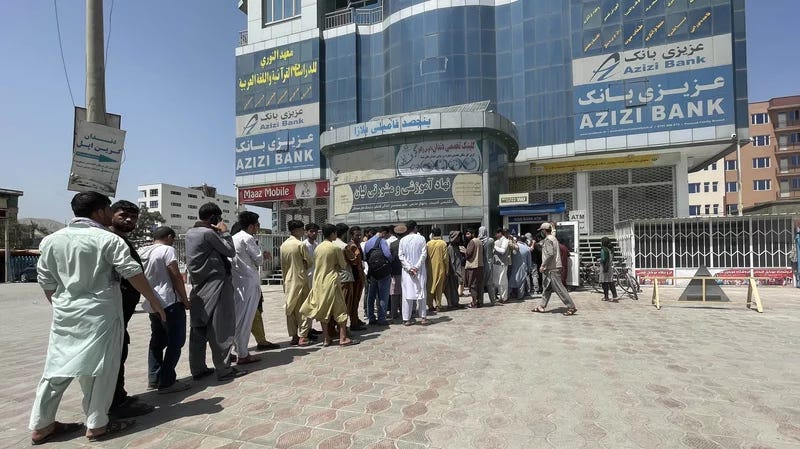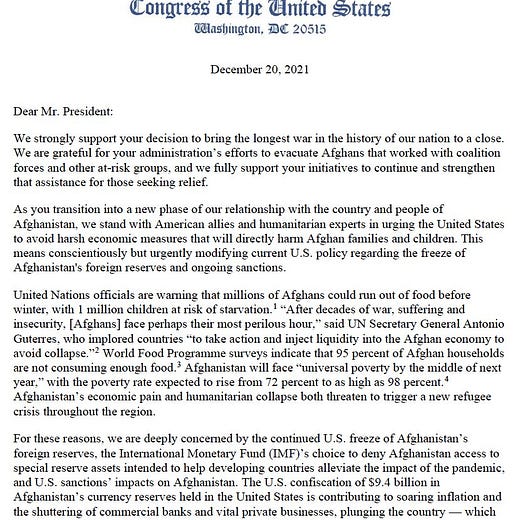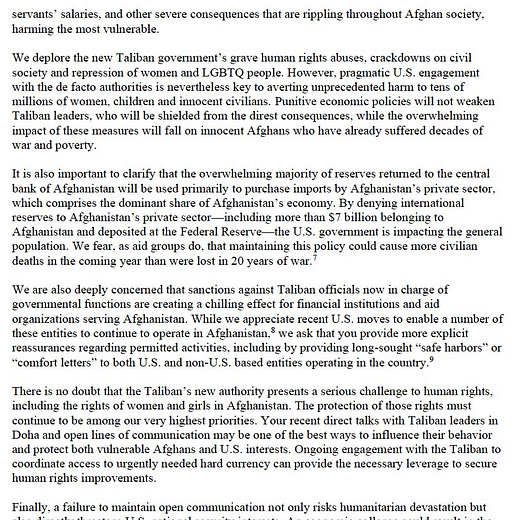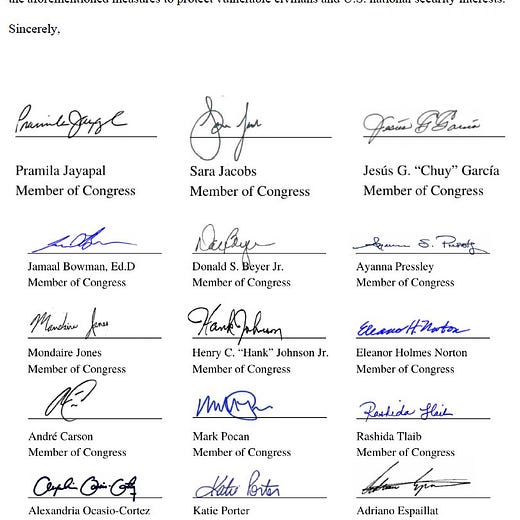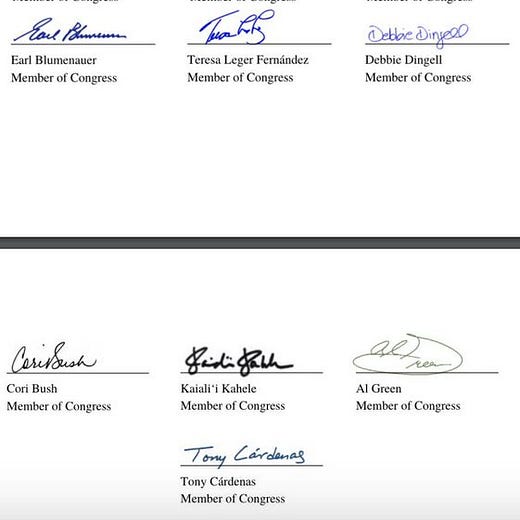President Biden, Unfreeze Afghanistan Now
To avert the world's gravest humanitarian crisis, the time for action was yesterday
"War is a continuation of policy by other means," Carl von Clausewitz, Prussian General.
The United States is running a very cruel experiment in Afghanistan right now. I’ll explain it in a minute, but first here’s some context.
Afghanistan is one of the poorest countries on Earth, a mountainous, battle-scarred territory of 40 million people. It is a “failed state.” About 90% of the people are destitute, surviving on less than two dollars per day. International aid in Afghanistan is not a nice to have, it's a need to have for more than 50% of the population. There are 3.5 million internally displaced people in the country due to the 20 year war with the U.S. Toss in a Covid-19 pandemic. Throw in the worst drought seen in decades. Now, add in another 500,000 displaced people, uprooted after the Taliban takeover. Mix this all up and then put the entire country in the freezer for the bitterly cold Afghan winter.
Based on just these factors alone, the World Food Program projected back in August that 14 million Afghans were “facing food insecurity” this winter, which is a fancy way of saying that 14 million people would likely starve as the weather got colder across the country.
Ready for the experiment now ?
Imagine if, on top of all these tragic circumstances, you suddenly and permanently froze the vast majority of cash, humanitarian aid and financial services in Afghanistan.
What might happen next?
Well, you don’t have to be Nostradamus to answer the question. That’s because the United States government is running this experiment in real time, right now, as you read these words.
The devastating results of the experiment are already coming in. Emaciated, starving, and sick 11 year olds weighing 28 pounds are already fleeing the provinces for Kabuls in a desperate, last minute scramble to avoid death. 12 year old girls are being sold off as child brides in order for families to put bread on the table. Children are so malnourished that their skin is peeling off and they do not have enough nourishment in their bodies to cry. According to UNICEF, At least 1m children are projected to starve in the coming months.
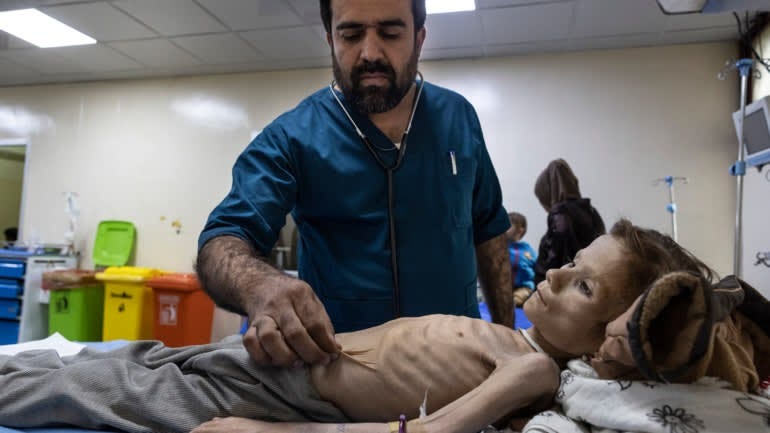
The World Food Program, winners of the Nobel Peace Prize in 2020 for their humanitarian efforts around the globe, now predict that approximately 23 million people will be facing food insecurity over the winter.
This is a staggering increase of 9 million people from their original projection.
I chatted to Shelley Thakral, WFP Spokesperson for Afghanistan based in Kabul, to try and understand why this increase has occurred. She told me over a Zoom chat,
“Back in August millions of very innocent Afghans were already at risk of dying. Because of the freezing of assets, the withdrawals of international aid, you had cash shortages, job losses, unpaid salaries -- and now we’re seeing a much larger scale of suffering”
I learned about the dire economic situation in Afghanistan back in early September only because my company, Storyhunter, suddenly was unable to find any bank who would process our transactions to our freelancers working inside the country. We are a global marketplace for local creators to access work opportunities, and have bee doing business in the country since 2014. We had never had a problem paying our journalists or videographers in Afghanistan until late August, when our payments suddenly got stuck somewhere in transit.
Here’s why:
Just as the Taliban were on the verge of taking over the country in mid-August, the United States froze around $9 billion, the majority of Afghanistan's foreign reserves , which is cash belonging to the Afghan government and Afghan business owners. The Afghan banks who were storing their capital in in the Federal Reserve Bank of New York for security purposes and preferred interest rates, literally lost their most vital asset practically overnight.
Removing cash from a barely functioning economy is kind of like removing oil from a barely functioning car engine. It will sputter along for a bit but will ultimately seize itself.
And this is exactly what happened.
This single policy act caused an immediate liquidity crisis in an already crippled economy. Banks no longer did the most basic thing that banks do, which is distribute cash. Afghan businesses and individuals could no longer pull any of their own money from their own bank accounts. Imagine the outrage if that were to happen in the U.S.A! The lucky Afghans who have been able to pull out cash have been capped at 20,000 Afghanis, roughly $200, per week.
What’s unique about this economic attack on Afghanistan’s financial institutions is how it affects people who were once productive members of society. Business owners, freelancers, and salaried employees who depended on a functioning financial system are now struggling to put bread on the table. Their dependents and employees are then fall into this chain reaction of debts and IOUs. As a result, it’s not just rural or poor people who are on the verge of starvation in Afghanistan. The entire nation is suddenly at risk.
“For the first time urban residents of Kabul and other cities who have never experienced food insecurity now do,” Thakral told me. “They’ve lost their jobs and livelihoods. They have limited access to money, and are suffering at similar rates to rural communities.”
I’ve been in touch with one of the freelancers we've been trying to pay in Kabul with little success to see how he was doing.
“I am much more afraid about what’s happening to the economy, than of the Taliban,” M told me with a tremor in his voice. “There is no cash in the country, no way to buy wheat and vegetables.”
For safety purposes, we decided not to reveal his identity. But what I can tell you is that he is a hardworking, professional journalist who is a regular contributor to large media organizations.
Before August, M had four working people in his family, supporting a total of 15 people in the household, including parents, uncles, aunts, and his own two children. Now, he is the only one working, trying to support all of them. And he is unsure how, or whether, he will get paid.
Without cash, M tells me that things are so bad in the capital that many residents from Kabul are fleeing to the provinces. “There are not many services, facilities, and the hospitals are running out of medicine, and so many people are moving to the countryside,” he told me.
M himself used to live very comfortably in Kabul in a large home. As a result of the cash crunch, he had to move his family to a smaller house because they could no longer afford the rent. He describes the living situation as “small and congested.” They have limited purchases to just the essentials.
“No luxury items, no shopping, no new clothes, the only thing we buy now is food,” he told me.
Despite the cutbacks, M’s family has blown through their savings and have had to take loans from friends outside the country to get by. But even those loans are hard to get because they have to go through multiple countries to get into Afghanistan. Even if the money does reach his bank account, his bank is fickle about what they release. Sometimes it’s nothing. Sometimes it’s only the equivalent of $200.
“20,000 Afghanis [$200] is not nearly enough to support a family of 15 in Kabul,” he said.
Especially these days. As a result of the financial crisis, the Afghani has tanked in value. Due to the scarcity of goods, prices on just about every commodity have gone up. M has been tracking the price increases himself so his family can prioritize what to buy. He says that everything is up 20-30% since August.
After months of failed attempts, we eventually found a way to pay M.
We went through some intermediaries in Turkey, who are operators in what’s known as the Hawala network, a traditional, offline payment system that has operated in the Middle East and Asia for many decades. It is typically used by drug and weapons traffickers and is now filling the void for the nearly defunct banking system. (Hello, Bitcoin?)
In this particular chain of the Hawala network, Storyhunter transfers funds to intermediaries in Turkey, who hold M’s money in their bank accounts in Turkish Lira, until it reaches a large enough amount that it makes sense to transfer. Sadly, it has depreciated in transit, since the Lira has plummeted in value against the dollar. The money eventually gets converted back to Dollars, and then, because the Taliban has decreed it illegal to trade in foreign currencies, into Afghanis that M can use to buy groceries. When you factor in exchange rates and commissions, M estimates he’s lost $500 in his earnings over the last couple months. We are now going to try paying him through Germany.
The United States government clearly has some unfinished business in Afghanistan. We may have withdrawn our troops from the country, but we refuse to leave Afghanistan alone.
After freezing the cash and financial services in Afghanistan, the U.S.’s next economic strike was to block monies that were slated to go to reconstruction and humanitarian aid. The World Bank, administered by the US, froze its 1.5 billion Afghanistan Reconstruction Trust Fund (ARTF). The Europeans also got in the game, directing the International Monetary Fund to block $460 million in humanitarian and medical aid. This means that a population that suddenly had no cash were also deprived of the aid that millions needed for their survival. Teachers, medical workers, and caregivers were among the service providers left penniless. Without foreign aid, the hospital and entire healthcare system are now on the brink of collapse.
Finally, the U.S. Department of Treasury and the UN Security Council maintained air tight sanctions against the Taliban, which, after they came to power, meant that any trade with the Afghan government is also now by default illegal.
These actions are felt even more acutely in Afghanistan considering the outsized role of the United States in the Afghan economy prior to August. Occupations are rarely discussed in economic terms, but this is often their most enduring legacy. For two decades, the American occupation of Afghanistan WAS the Afghanistan economy. The war and the military-industrial complex supporting it was by far the largest sector of the Afghan economy. Over twenty years, the U.S. spent nearly $1 trillion dollars in Afghanistan in a country whose GDP in 2020 was less than $20b.
Under U.S. occupation there was no functional, independent Afghan economy. There was a faux Afghan economy that the U.S. artificially propped up through a network of contractors and sub-contractors. What we built over 20 years was a large house of cards, or in this case 500 military bases, which has been toppled. This money did not build a nation, but did enrich many Americans who invested in companies like Lockheed Martin and Halliburton. It also paid for the salaries of the 400,000 members of the Afghan army, plus a slew of contractors and subcontractors employed by the Americans. The Afghan contingent, an estimated millions of people, are now suddenly unemployed, in an economy with no cash and zero job prospects.
This is how you turn a “failed state” into the humanity’s most severe humanitarian crisis. It is an unprecedented economic stranglehold.
I desperately wanted to talk to someone from the private sector of Afghanistan to gain some perspective on how this financial crisis is affecting the main industry still standing in Afghanistan, agriculture. An estimated 70 percent of Afghans live and work in rural areas, mostly on farms, and 61 percent of all households derive income from agriculture. Partly because of the work of USAID and American NGO’s like Roots of Peace, Afghan agricultural exports have increased in recent years. These organizations work to educate Afghan farmers about higher value crops like pomegranates, grapes, and peaches, and provide support for the marketing of these products abroad.
I wondered how some of these entrepreneurs were faring amidst the cash crunch, and ended up connecting with an entrepreneur who runs a juice company out of Kandahar. To protect his identity, I will refer to him as “A.”
A is literally crushing it. He buys 100 metric tons of pomegranates/day which his factories crush into natural, nutritious pomegranate juice. He employs over 300 people and works directly with the farmers growing pomegranates and grapes in the farmlands surrounding Kandahar city. His company packages and sells juice all over the world, with distributors in Saudi Arabia, India, Dubai, Canada, the UK and Europe. For the last 3 years, he has supplied a major multinational corporation with a line of pomegranate juice. In exchange they wired money to his bank account. But now due to the financial crisis he can’t receive money from this company or any other customers. He also cannot pay the salaries of his employees.
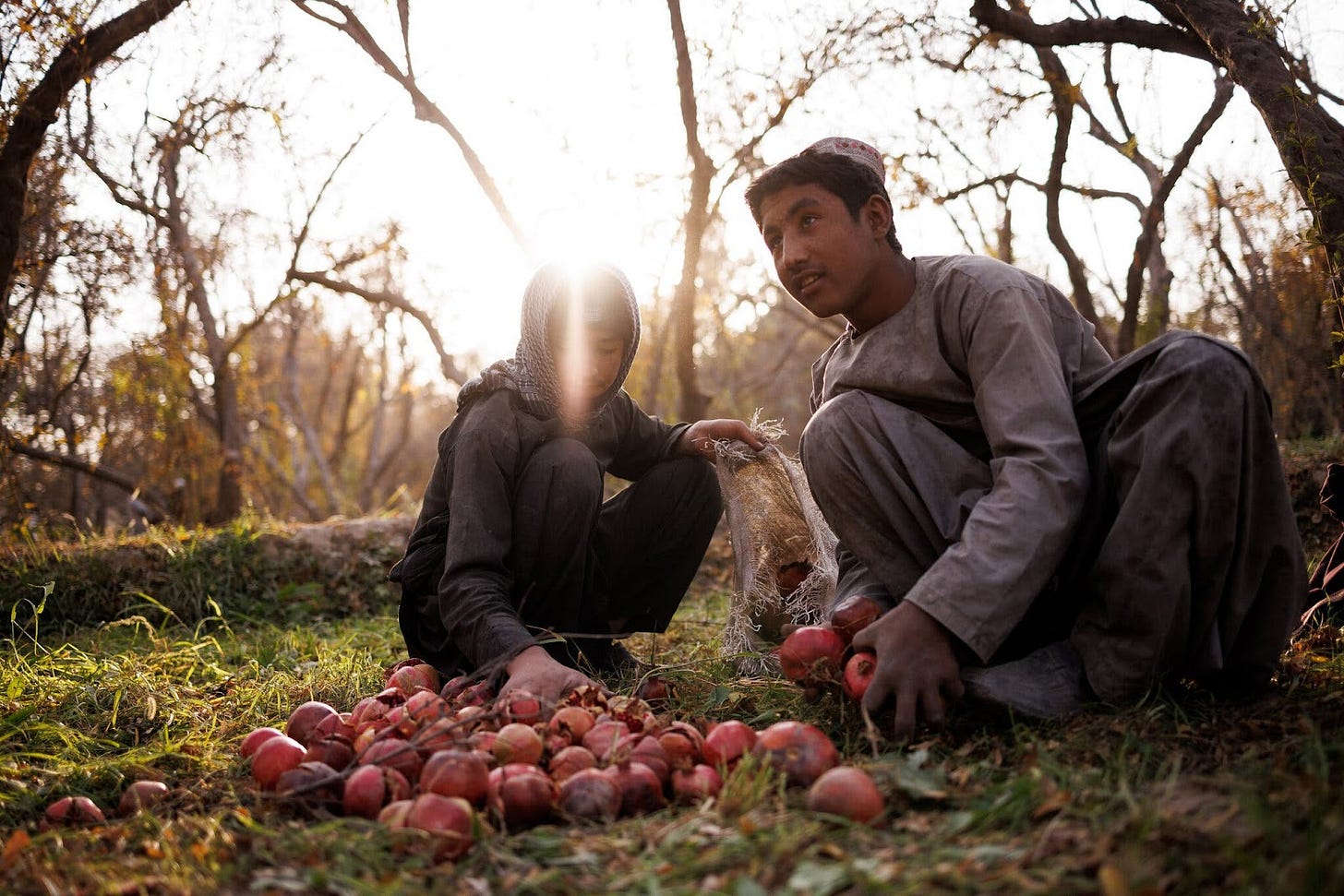
“We don't know politics. We are farmers and laborers, with our money stuck in bank --- What we hope and request from the Americans is that they release the people’s money -- it directly affects the normal people here. “ A told me over a Whatsapp call.
Despite the cash crisis, the orders for his 100% natural pomegranate juice keep rolling in.
“We have customer trust that we have built over 8 years. We are not going to tell them no. Our customers need our product.”
In Kandahar, a medium-sized pomegranate goes for the equivalent of about 15 US cents, but by the time the fruit reach Kabul they cost about three times that. (AFP)
So he’s sending the juice to his customers anyways and is scrambling to open an affiliate office and bank account in Dubai so he can get paid somehow, even though that still won't solve the problem of getting the money to Afghanistan.
“Everywhere we are blocked, from left to right, east to west. This is really hurting us.”
While there is no cash in the country, there is plenty of fruit in the trees. A few weeks ago, a record amount of pomegranates were harvested. Despite the drought it ended up being a bumper crop for pomegranates because of some of the innovations in water management in recent years. Normally in this harvest season, the farmers and laborers reap what they sowed many months ago.
But this year is different.
“Poor people work every day like laborers. They work the whole year and are waiting for it [harvest time] and the season comes and they turn it into cash. Now they are getting paid partly in cash, but mostly in I.O.U.’s. A is struggling to keep the operation running. He says that he is paying his 300 employees in dribs and drabs.
“We’re trying to pay as much as we can. We’re trying to our best.” he said.
In a sense, Afghanistan has gone from a country of IED’s to a country of IOU’s. But IOU’s can’t be used for food or fuel. A fears the worst for his employees, their families, and all his countrymen.
A told me,
“There is no food, no fire. Many poor people will be dead this winter. ”
Starving businesses leads to starving people. It is particularly hypocritical for a country like the U.S. to do this, considering that the value so many Americans place on entrepreneurship. How will Afghanistan ever break the cycle of poverty, aid, and terror, if we won’t allow businesses to succeed ?
So what is the end game for the United States ? Are policy makers thinking that a total collapse of Afghanistan will flush out the Taliban ? Maybe, but I doubt it. If we’ve learned anything from history, it’s that total collapses are exactly the right conditions for terrorist groups to thrive. The Taliban will simply resort to more opium dealing, weapon smuggling and extortion to make their money. The economic attacks will then serve as a scapegoat to help blame the U.S. for all the ills of society, giving the Taliban a free pass to err without culpability. This is a very tired playbook.
The United States clearly still hasn’t learned several of its most important post 9/11 lessons.
Here’s another one: Don’t provide terrorists a new recruitment base by depriving Muslims of resources and opportunity.
This is precisely what we’re doing in Afghanistan. As we’ve seen time and again in Yemen, Somalia, Pakistan, and even France, poor people are often the most susceptible recruits for jihad. The US is doing a fine job at making Muslims poorer in Afghanistan. This will only make the Taliban stronger. These policies will lead to renewed and more widespread anti-American sentiment in the Muslim world. If that happens, the war on terror will persist for at least another generation.
So the question is, why? Why is the U.S., supposedly the most powerful country in the world, making this calculation in Afghanistan that once again seems likely to backfire? Do policy makers really think the Taliban, a ragtag army of roughly 100,000 men that resisted the U.S. military for 20 years for ideological reasons, are going to suddenly buckle because of some starving children? Is this an act of vengeance? Is it an attempt to restore the perception of American strength after a shameful withdrawal? Or is this simply a horrific lapse of judgement stemming from group think?
We don’t have the answer to any of these questions, yet, but we deserve them.
Here’s another question: Why can’t we let Afghanistan be an independent country, left to succeed or fail on its own merit ? If the Taliban then harm the U.S. or American interests, we will then have every right to use force or measured economic attacks against them.
I pitched this idea to both A and M. Interestingly, each one said versions of the same thing. They don't want the United States to leave. They also don't resent the United States or the Taliban -- yet. Their ideal outcome is actually for the United States to work with the Taliban as a partner. Their dream is for them to work together. The Taliban have the street credibility and authority to rule Afghanistan, but lack the procedural know-how in running a government and developing the country. They view the U.S. as the ideal advisers for the Taliban in reforming themselves and building their own nation.
As one of them said to me,
“Uneducated people don't know how to run the country. The Americans need to work with the Taliban and show them the right way to run the government. If they stay with us, it will be helpful. If they leave us in this way, everything will shut down. We will go backwards.”
I have my doubts about the U.S. and Taliban ever working together, but it’s important for people to understand that this is a popular position of many intelligent and patriotic Afghans. They fear the sovereign rule of either group left to their own devices, and are praying that the U.S. and Taliban can reach some kind of an accord.
Will this economic pressure lead to the Taliban working with the US in a mutually agreeable way to rebuild the country ?
Again, I doubt it. But even if it does somehow work out this way, at what cost ?
Explaining the logic for the freezing of the funds, Marcela Sanchez-Bender, a World Bank spokesperson provided a moral argument, saying, “We are deeply concerned about the situation in Afghanistan and the impact on the country’s development prospects, especially for women.”
I share her concern. The Taliban are a violent, terrorist organization that has historically deprived Afghans, especially female Afghans of any rights, let alone prospects of development. But the immediate, net effect of the World Bank’s policy is that women will starve on equal footing with men. This is not the kind of equality anyone wants.
The World Bank’s logic of choosing “development prospects” over meeting the basic nutritional and medical needs of an aid dependent country like Afghanistan -- is twisted and perverse. Development is a long term game, but aid is necessary in the short run in order to reach the stage where meaningful development can occur.
After 20 years of physical war, “U.S. values” are once again being trumpeted as a front for wholly misguided and amoral U.S. foreign policy calculations in this economic war. This time, we’ve given up the post 9/11 war time slogans of “nation building” and “spreading democracy” and replaced them with “Women’s rights” and “development prospects” as the reasons for risking the lives of innocent Afghans.
The moral case against the United States policies in Afghanistan should be self-evident to any person with a beating heart.
The gory, visible war of bullets and bombs between the U.S. and the Taliban has been replaced by an invisible economic war that may be even more barbaric. This new phase of war pits the U.S. and the wealthiest countries on Earth against the entire population of Afghanistan, 40 million people.
The old weapons of war, bullets, grenades, and drone strikes, have been replaced by salvos of sanctions, asset seizures, and reduction of humanitarian and medical aid. These are economic weapons of mass destruction, designed not for precision but for collective punishment.
The simultaneous, orchestrated deployment of these policies against a dysfunctional, aid dependent economy with an already critically vulnerable population, has the potential to be far more disastrous for than 20 years of battle, which took the lives of about 176,000 people. In this war, people don’t die quickly and suddenly from trauma, IED’s, and/or drone strikes, but slowly, from malnutrition, famine and/or disease.
Setting in motion a set of policies that starves millions of people, regardless of the policy’s purpose, is wrong.
This U.S. is stooping down to the level of a terrorist organization, playing a sinister geopolitical chess match where all the pawns can get sacrificed if it leads to “victory.”
It feels absurd to type this, but Afghans are not pawns. They are living, breathing human beings like you and me, with dreams, fears and aspirations for their lives. All of this is on the line right now.
Certainly President Joe Biden should be held accountable for this economic assault. If the government has a rationale for this that they are not stating, now is the time for transparency. Biden should explain that withdrawal was a smokescreen for our most brutal campaign on Afghanistan to date. Americans need to know the war did not end. In many ways, it got worse.
The news media in the U.S. also needs to do a better job of covering Afghanistan whilst explaining the U.S.’s responsibility in the total breakdown of the country. The American people deserve at the very least the opportunity to judge the potential efficacy and ethics of our policies vis-a-vis Afghanistan. If we don’t change course, this must become a campaign issue for every national political race in 2022 and beyond.
In a welcome sign that this issue is finally getting some attention, 40 House democrats yesterday signed a letter to President Biden and the Treasury department urging them to unfreeze Afghanistan’s funds.
For those Americans hoping to put Afghanistan in the rear view mirror, sorry to disappoint. The poor country thousands of miles away is once again in our path of destruction, and we don’t have a lot of time to change course. For some Afghans too malnourished or sick to survive this winter, it is already too little, too late. But there is still time to save many others by mitigating or reversing our economic assault on the country ASAP. So if you’re an American privileged enough to be able to eat a warm meal with your family this holiday season, first know that you are blessed with tremendous fortune. Then you may want to take a moment to deliver this message to Joe Biden and your elected leaders: Unfreeze Afghanistan.


